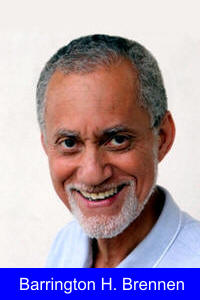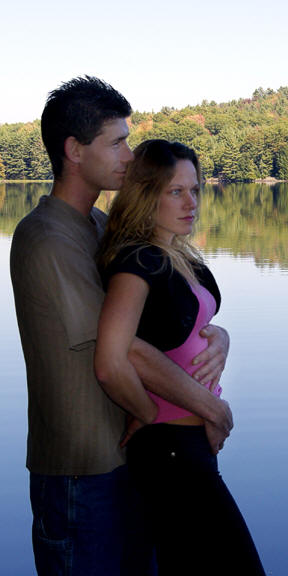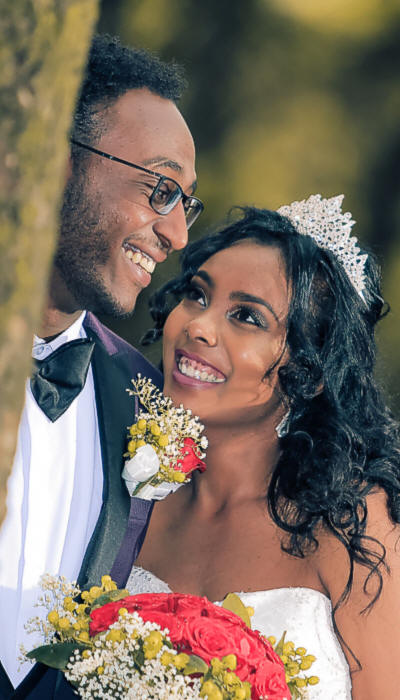-
Essentials for
Marriage Preparation
-
All you need to know
about preparation for marriage
-
By Barrington H. Brennen, June 8, 2005,
February 2016, November 2020
-
 Unfortunately, too many couples
getting married spend more time preparing for the wedding day than the
marriage itself, thus, increasing the possibility of marital discord and
breakup. Research tells us that marriage preparation is the one sure way of
reducing marital dissolution. Marriage preparation may not prevent problems
in marriage, but it can equip couples with the tools needed to handle
disappointments in marriage and maintain a spicy marriage. The marriage that
breaks up in the few months or perhaps even after 20 or 30 years usually
comes to an end because problems were not solved at the beginning.
Unfortunately, too many couples
getting married spend more time preparing for the wedding day than the
marriage itself, thus, increasing the possibility of marital discord and
breakup. Research tells us that marriage preparation is the one sure way of
reducing marital dissolution. Marriage preparation may not prevent problems
in marriage, but it can equip couples with the tools needed to handle
disappointments in marriage and maintain a spicy marriage. The marriage that
breaks up in the few months or perhaps even after 20 or 30 years usually
comes to an end because problems were not solved at the beginning.
What is Pre-Marriage Education?
It is imperative that we view marriage preparation encompassing a long
process of learning involving parents, family, society, church, and formal
training. Many do not fully understanding the meaning and importance of
preparation for marriage. First of all, many often refer to it as
pre-marriage counseling. However, preparation for marriage is better
described as an educational process at best, rather than a counseling or
therapeutic process. Thus we have the term Pre-Marriage Education, meaning
that a couple is taken systematically through a process of instruction on
various subjects and themes of life. Like in the classroom, they are to make
personal applications, and where necessary, adjustments.
Although pre-marriage preparation is an educational process, yet there are
times when individual or couple therapy is necessary. Many take damaging
emotional baggage in the relationship, stifling growth and happiness. Some
have been so broken and battered as children that it is almost inevitable to
avoid a high level of marital stress without going through the process of
pre-marriage education and counseling. Above all, it is imperative that we
view marriage preparation as a life-changing educational process for all who
are getting married.
A Good Marriage Does Not Happen by Default
No one is inherently blessed with all the knowledge and wisdom needed for
healthy marital functioning or satisfaction. It does not matter how
intelligent you are or how well your parents educated you on the issues of
life, although thatís important. It even does not matter if you are a well
disciplined, independent thinking, mature adult; although this is a
paramount prerequisite for a happy marriage. Pre-Marriage Education is a
must for everyone. Why is it so? Because marriage is a university, from
which one cannot really graduate. The information and tools necessary to
make a marriage work can only be garnered from those who are on the marriage
pathway and from those who have made it their purpose to study the
intricacies of life, social development, and the dynamics of relationships.
A specialist in pre-marriage preparation, Robyn Parker defines it this way:
ďIn general, pre-marriage programs seek to engage couples in the processes
of reflection and skills training with the aim of promoting and supporting
the development of strong and stable relationships.Ē
 Isnít it amazing how serious we are about going to school from the age of
five or seven and up to age twenty or thirty to obtain the knowledge and
skills necessary for a particular career? However, we are not as serious
about a life decision, marriage, that has the greatest potential of
emotionally or physically destroying us. Every couple getting married, no
matter the age or how many times they were married before, should receive
pre-marriage education. Those individuals who are divorced and getting
marriage again are even at greater risk of marital troubles without
pre-marriage education. Remember, marriage is a university from which we can
never graduate. Divorce is not graduation. It is school drop out.
Isnít it amazing how serious we are about going to school from the age of
five or seven and up to age twenty or thirty to obtain the knowledge and
skills necessary for a particular career? However, we are not as serious
about a life decision, marriage, that has the greatest potential of
emotionally or physically destroying us. Every couple getting married, no
matter the age or how many times they were married before, should receive
pre-marriage education. Those individuals who are divorced and getting
marriage again are even at greater risk of marital troubles without
pre-marriage education. Remember, marriage is a university from which we can
never graduate. Divorce is not graduation. It is school drop out.
The Brennen Stages of Pre-Marriage Preparation
To understand the full scope of preparation for marriage, it will be
important to view it in two stages. (I formulated these stages in 2000). The first is the informal stage of
pre-marriage preparation. The second is its formal stage. Both stages are
interrelated and are important as the other. Let us define and explain each
stage.
Informal Stage: This is the time when children best learn from the
modeling of parental attitudes and behaviors and from their own
experimentation. This is the stage when far too many parents are not aware
how much they are influencing the future adult life and marriage of their
tender offspring. The informal stage can further be divided in two phases:
1)
The parental
modeling stage (from birth to pre-teens) or the formation
years. This is the time when parents have the greatest impact on the
lives of their children. From birth children will experience warmth,
love, and caring which will help them develop trust, inner peace, and
self-respect--an important prerequisite for a healthy marriage. On the
other hand, if they experience little or no love, unnecessary pain,
shame, and disappointment, then it is more than likely that they will
develop a lack of trust in people and have strong feelings of being
unloved. These individuals would seek to get married for the wrong
reason: To fulfill whatís missing in their lives. Thatís dangerous.
2) The personal exploration stage
(teens to young adulthood)
or the experimental years. This is the time when children move away
from dependence on parents to independence. During this phase
experimentation is the name of the game. This is the time when the teens
will choose to or not to put into practice principles of life modeled by
their parents. Some will fall in and out of love and respond to those
experiences depending on their early childhood development. These years
are most crucial to pre-marriage preparation. It is the time when sex,
drug, and alcohol, and other social behaviors will test the will power
and inner strength of developing minds. If they respond negatively to
these outside forces, the chances of having a healthy marriage will be
thwarted.
The Formal Stage: This
is the time when structured, form al training and education of lifeís issues
and marriage itself take place. I call this the application years (adulthood). It is also when all the parental influences, early
childhood training, teenage experimentation and experiences will blend
together as adults make lifelong applications. Through formal education,
what I call Pre-Marriage Education, couples are assisted by a trained and
knowledgeable professionals to understand and apply their lifeís experience
thus far to a new dynamic relationshipĖmarriage. They are further equipped
with skills and tools to better assist them in the other areas of their
lives.
al training and education of lifeís issues
and marriage itself take place. I call this the application years (adulthood). It is also when all the parental influences, early
childhood training, teenage experimentation and experiences will blend
together as adults make lifelong applications. Through formal education,
what I call Pre-Marriage Education, couples are assisted by a trained and
knowledgeable professionals to understand and apply their lifeís experience
thus far to a new dynamic relationshipĖmarriage. They are further equipped
with skills and tools to better assist them in the other areas of their
lives.
How Should Pre-Marriage Education Programs Work?
Pre-marriage education programs can be in two formats:
1) The couple or
personal format where the couple sees a trained pastor, marriage therapist,
or specialist in pre-marriage education.
2) The group format is where the
couple may attend a weekend seminar or a short series for pre-married
couples. I believe that although both are not required, it is a positive
approach to participate in both formats of pre-marriage education. However,
the format that is most important is the couple or personal format because
it provides intense personal dialogue and freedom not available in a group
setting.
Do Not Rush
Ideally, a couple should begin a formal pre-marriage education program one
year before the date for marriage. If thatís not possible, a couple needs at
least six months before the wedding date to begin a pre-marriage education
program. A comprehensive, well-planned, pre-marriage education program takes
at least eight to ten sessions, although it can be much longer. If
pre-marriage education starts one year before the marriage, sessions can be
spread over a period of six to eight months, allowing time for adjustments,
practice, personal application and growth.
Good pre-marriage education cannot be packed in a one-week or one-day
period. Time is needed for the couples to contemplate on what is being
taught. It will be unwise for any pastor, counselor or psychologist to rush
a couple through the process of pre-marriage education just so they can
fulfill the wedding day appointment.
Who Should Conduct the Education?
To whom should a couple go to for pre-marriage education. First of all, a
Christian couple must keep their pastor up to date about the development of
their relationship. Even if they feel he/she is not qualified to provide
pre-marriage counseling, he/she is their pastor, and is the main coordinator
of the wedding ceremony. The pastor who will not be providing the
pre-marriage education should have at least three planning sessions with the
couple. Non-Christian couples or secular couples also should follow
these essentials for pre-marriage education. They should seek a
counselor with whom them feel comfortable.
It is best that a couple seek someone who is trained and experienced in
pre-marriage education. Not all pastors have the training and skills that
are necessary to prepare couples for marriage. Find out your pastorís
credentials. Talk to other couples whom the pastor may have counseled and
also talk to your pastor about it.
 It is great if there is a pastor who has
significant skills and experience in successfully preparing couples for
marriage because marriage is sacred and holy.
It is great if there is a pastor who has
significant skills and experience in successfully preparing couples for
marriage because marriage is sacred and holy.
There are also professional, full-time specialists in pre-marriage
education. These persons have studied the dynamics of relationships and know
best how to train couples and help them through the growing crisis of
marriage preparation and marriage itself. Couples should look for a
counselor or psychologist who is trained in marriage and family and
pre-marriage education. There are also individuals who have attended
certificate courses and have become experts in training couples for
marriage, although they may not have a degree. These are the ones you will
want to prepare you for marriage.
What to talk about?
What do couples talk about when preparing for marriage? Pre-marriage
education programs will deal with at least sixteen subjects.
They are:
-
Godís plan for
marriage (For faith believers).
-
Religious values
(For faith believers).
-
Roles Exploration
and Expectations
-
Sexuality.
Contraception, sexual health, methods.
-
Finances.
Couple Financial Planning, Budgeting.
-
In-laws.
Prioritizing relationships.
-
Health and family
planning. Family health history.
-
Values and goals.
-
Communication.
-
Creative problem
solving.
-
Love and feelings.
-
Leisure time
together and apart
-
Issues of power and
control.
-
Intimate partner
abuse.
-
Parenting.
Education, discipline, etc.
-
Step parenting/blended
family life.
-
Forgiveness and
trust.
-
Avoiding the
pitfalls of the electronic media/texting, etc.
-
Couple closeness.
-
Romance and
friendship, balancing time apart and together.
-
Partner style and
habits.
-
Starting a home.
-
The wedding.
-
The honeymoon.
-
After the wedding.
-
etc
Good pre-marriage education
encourages the couple to think objectively and wisely about getting married.
It also empowers them to cancel getting married if they discover that it
will be unwise. Couples need to be honest and open with each other. The pain
resulting from canceling a wedding ceremony cannot be compared to the pain
experienced in a troubled marriage or an unexpected divorce. Dear reader, if
you are getting married within the next twelve months, I encourage you to
seek pre-marriage education now. Do not delay. Your life depends on it.
Barrington Brennen is a marriage and family therapist and counseling
psychologist. Send your question, comments or request for counseling to P.O.
Box CB-11045, Nassau, Bahamas; or call 242-327 1980, or email
question@soencouragement.org